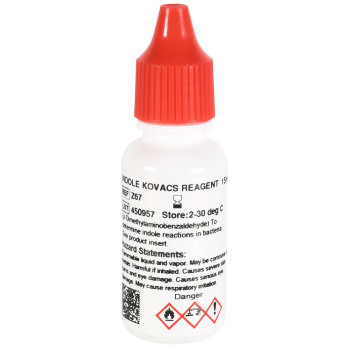Description
Kovac′s reagent for indoles, 100mL
suitable for microbiology
Synonym(s):
4-(Dimethylamino)benzaldehyde solution
Empirical Formula (Hill Notation):
C9H11NO
CAS Number:
100-10-7
Molecular Weight:
149.19
Beilstein/REAXYS Number:
4132845
MDL number:
MFCD00003381
PubChem Substance ID:
329760541
NACRES:
NA.85
PROPERTIES
agency
according to ISO 16654:2001
Quality Level
200
product line
BioChemika
shelf life
limited shelf life, expiry date on the label
composition
4-(dimethlyamino)benzaldehyde, 50 g/L
hydrochloric acid, 240 g/L
isoamylic alcohol, 710 g/L
technique(s)
microbe id | specific enzyme detection: suitable
application(s)
agriculture
clinical testing
environmental
food and beverages
microbiology
storage temp.
2-8°C
suitability
Escherichia coli
coliforms
SMILES string
[H]C(=O)c1ccc(cc1)N(C)C
InChI
1S/C9H11NO/c1-10(2)9-5-3-8(7-11)4-6-9/h3-7H,1-2H3
InChI key
BGNGWHSBYQYVRX-UHFFFAOYSA-N
DESCRIPTION
General description
Kovac′s reagent is prepared by mixing p-dimethylaminobenzaldehyde, isoamyl alcohol and concentrated hydrochloric acid.[1] For identification of an organism, the formation of Indole from a tryptophan substrate is a useful diagnostic tool. Indole production is a crucial test in identification of Escherichia coli. After incubation, adding the reagent will help in determination if Indole that has been produced. The reagent turns red when reacts with Indole.[2]
Application
In the presence of oxygen, some bacteria, like E.coli, are able to split tryptophan into indole and alpha-aminopropionic acid. This reagent is for detecting the indole and identify the indole-positive and indole-negative microorganisms.
Kovac′s reagent may be used for spot test for determination of indole by saturating filter paper with the reagent.[3] It may also be used for initial spot test for determination of indole followed by quantification by spectrophotometric assay and HPLC-UV/Vis-MS/MS methods.[4]
SAFETY INFORMATION
signalword
Danger
hcodes
H226 - H290 - H314 - H317 - H332 - H335
pcodes
P210 - P233 - P280 - P303 + P361 + P353 - P304 + P340 + P310 - P305 + P351 + P338
Hazard Classifications
Acute Tox. 4 Inhalation - Eye Dam. 1 - Flam. Liq. 3 - Met. Corr. 1 - Skin Corr. 1B - Skin Sens. 1 - STOT SE 3
target_organs
Respiratory system
Storage Class
3 - Flammable liquids
wgk_germany
WGK 1
flash_point_f
109.4 °F
flash_point_c
43 °C
ppe
Faceshields, Gloves, Goggles, type ABEK (EN14387) respirator filter





